University Business Communication Reflective Writing Assignment
VerifiedAdded on 2021/06/14
|11
|3402
|34
Journal and Reflective Writing
AI Summary
This reflective writing assignment explores key concepts in business communication. The student reflects on corporate social responsibility (CSR) and crisis communication, highlighting the importance of social media in managing crises, while also acknowledging the spread of misinformation. The assignment delves into team communication, emphasizing its benefits for employee morale and innovation, while also addressing challenges like cultural barriers. The student also discusses interpersonal skills and their significance in preventing misunderstandings and fostering positive team dynamics. The assignment further examines non-verbal communication, recognizing its impact on information sharing and interpretation, particularly in online settings. The student integrates personal experiences and research to illustrate these concepts, demonstrating a comprehensive understanding of the subject matter and the application of these principles in a business context.
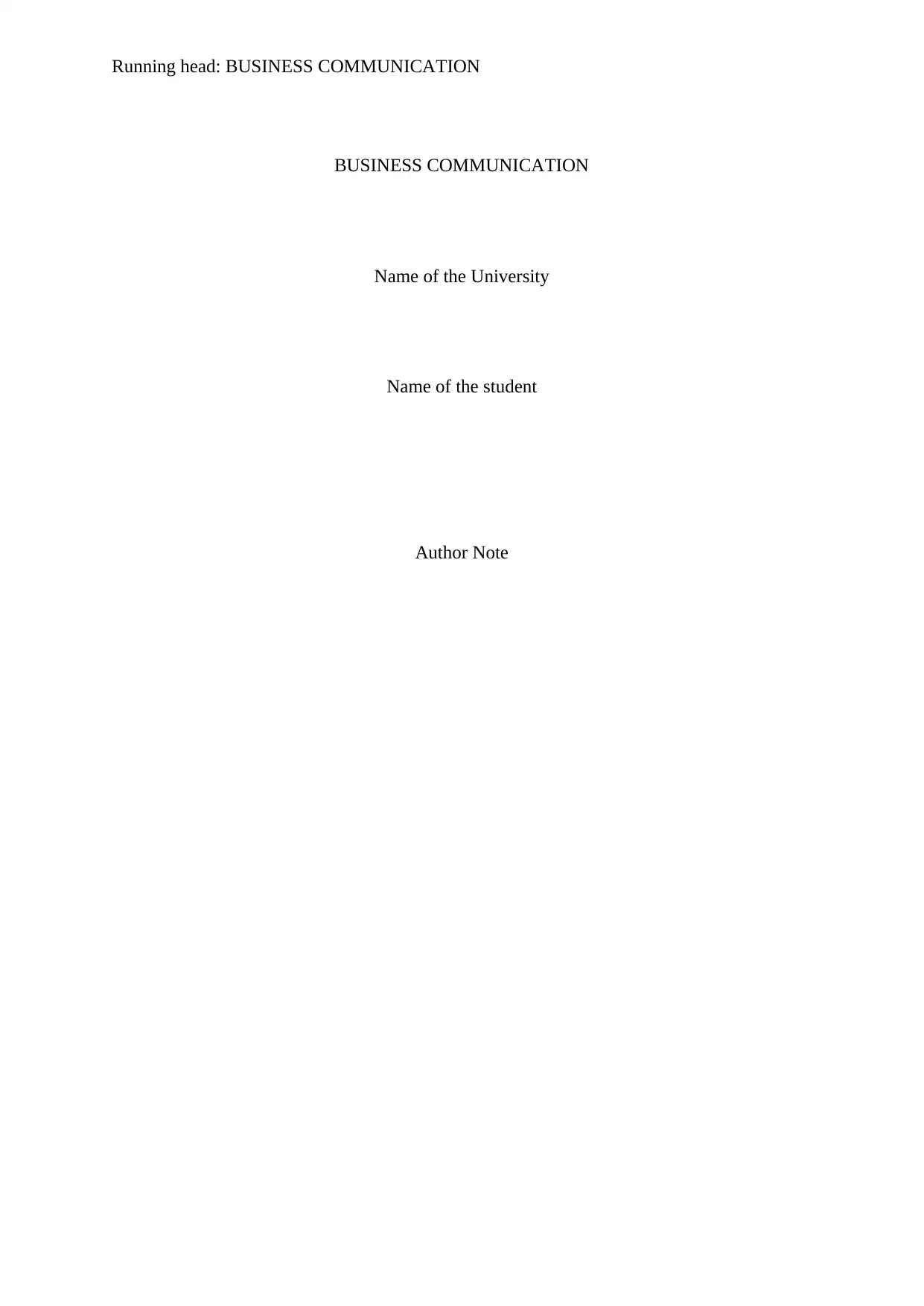
Running head: BUSINESS COMMUNICATION
BUSINESS COMMUNICATION
Name of the University
Name of the student
Author Note
BUSINESS COMMUNICATION
Name of the University
Name of the student
Author Note
Paraphrase This Document
Need a fresh take? Get an instant paraphrase of this document with our AI Paraphraser
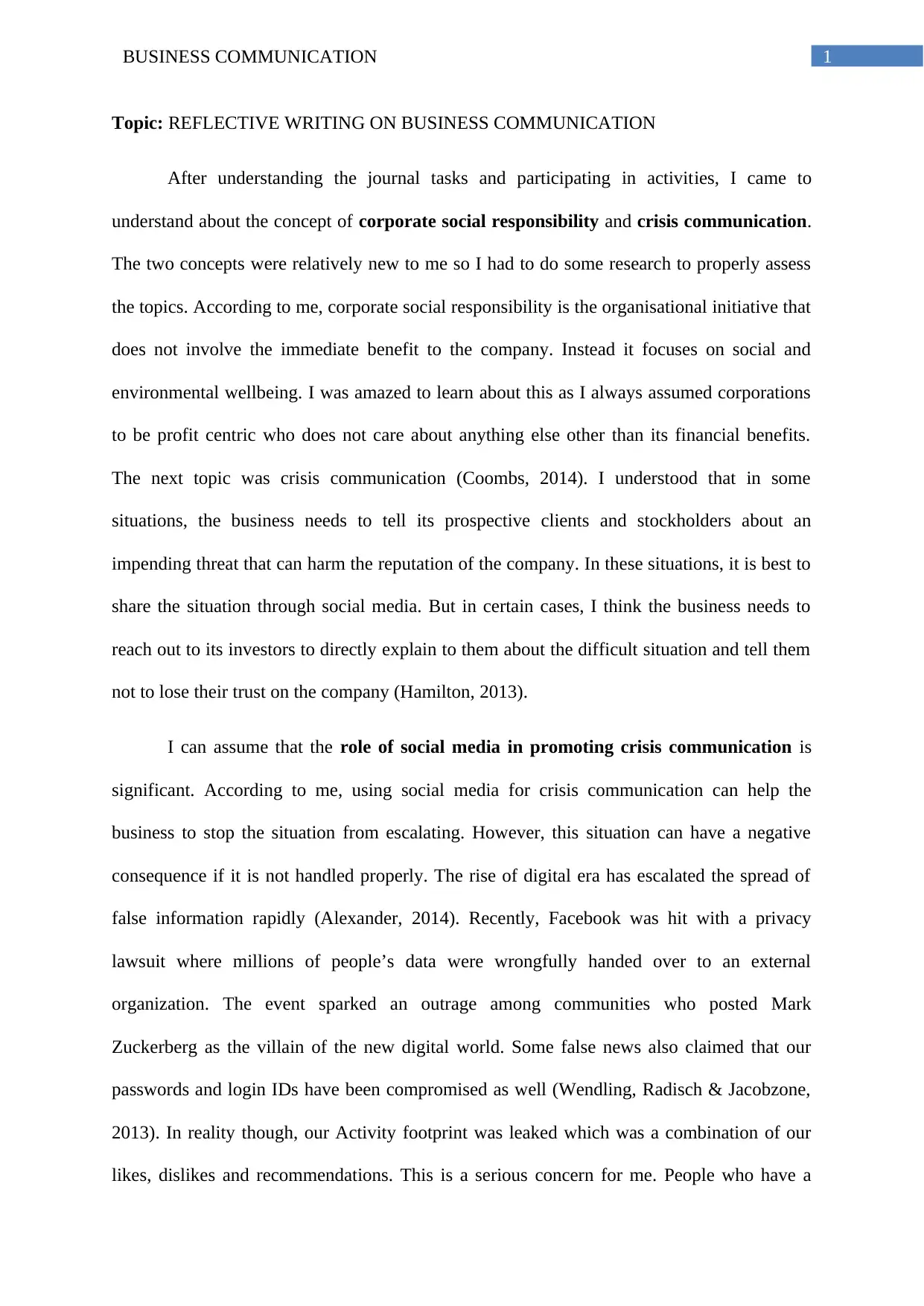
1BUSINESS COMMUNICATION
Topic: REFLECTIVE WRITING ON BUSINESS COMMUNICATION
After understanding the journal tasks and participating in activities, I came to
understand about the concept of corporate social responsibility and crisis communication.
The two concepts were relatively new to me so I had to do some research to properly assess
the topics. According to me, corporate social responsibility is the organisational initiative that
does not involve the immediate benefit to the company. Instead it focuses on social and
environmental wellbeing. I was amazed to learn about this as I always assumed corporations
to be profit centric who does not care about anything else other than its financial benefits.
The next topic was crisis communication (Coombs, 2014). I understood that in some
situations, the business needs to tell its prospective clients and stockholders about an
impending threat that can harm the reputation of the company. In these situations, it is best to
share the situation through social media. But in certain cases, I think the business needs to
reach out to its investors to directly explain to them about the difficult situation and tell them
not to lose their trust on the company (Hamilton, 2013).
I can assume that the role of social media in promoting crisis communication is
significant. According to me, using social media for crisis communication can help the
business to stop the situation from escalating. However, this situation can have a negative
consequence if it is not handled properly. The rise of digital era has escalated the spread of
false information rapidly (Alexander, 2014). Recently, Facebook was hit with a privacy
lawsuit where millions of people’s data were wrongfully handed over to an external
organization. The event sparked an outrage among communities who posted Mark
Zuckerberg as the villain of the new digital world. Some false news also claimed that our
passwords and login IDs have been compromised as well (Wendling, Radisch & Jacobzone,
2013). In reality though, our Activity footprint was leaked which was a combination of our
likes, dislikes and recommendations. This is a serious concern for me. People who have a
Topic: REFLECTIVE WRITING ON BUSINESS COMMUNICATION
After understanding the journal tasks and participating in activities, I came to
understand about the concept of corporate social responsibility and crisis communication.
The two concepts were relatively new to me so I had to do some research to properly assess
the topics. According to me, corporate social responsibility is the organisational initiative that
does not involve the immediate benefit to the company. Instead it focuses on social and
environmental wellbeing. I was amazed to learn about this as I always assumed corporations
to be profit centric who does not care about anything else other than its financial benefits.
The next topic was crisis communication (Coombs, 2014). I understood that in some
situations, the business needs to tell its prospective clients and stockholders about an
impending threat that can harm the reputation of the company. In these situations, it is best to
share the situation through social media. But in certain cases, I think the business needs to
reach out to its investors to directly explain to them about the difficult situation and tell them
not to lose their trust on the company (Hamilton, 2013).
I can assume that the role of social media in promoting crisis communication is
significant. According to me, using social media for crisis communication can help the
business to stop the situation from escalating. However, this situation can have a negative
consequence if it is not handled properly. The rise of digital era has escalated the spread of
false information rapidly (Alexander, 2014). Recently, Facebook was hit with a privacy
lawsuit where millions of people’s data were wrongfully handed over to an external
organization. The event sparked an outrage among communities who posted Mark
Zuckerberg as the villain of the new digital world. Some false news also claimed that our
passwords and login IDs have been compromised as well (Wendling, Radisch & Jacobzone,
2013). In reality though, our Activity footprint was leaked which was a combination of our
likes, dislikes and recommendations. This is a serious concern for me. People who have a
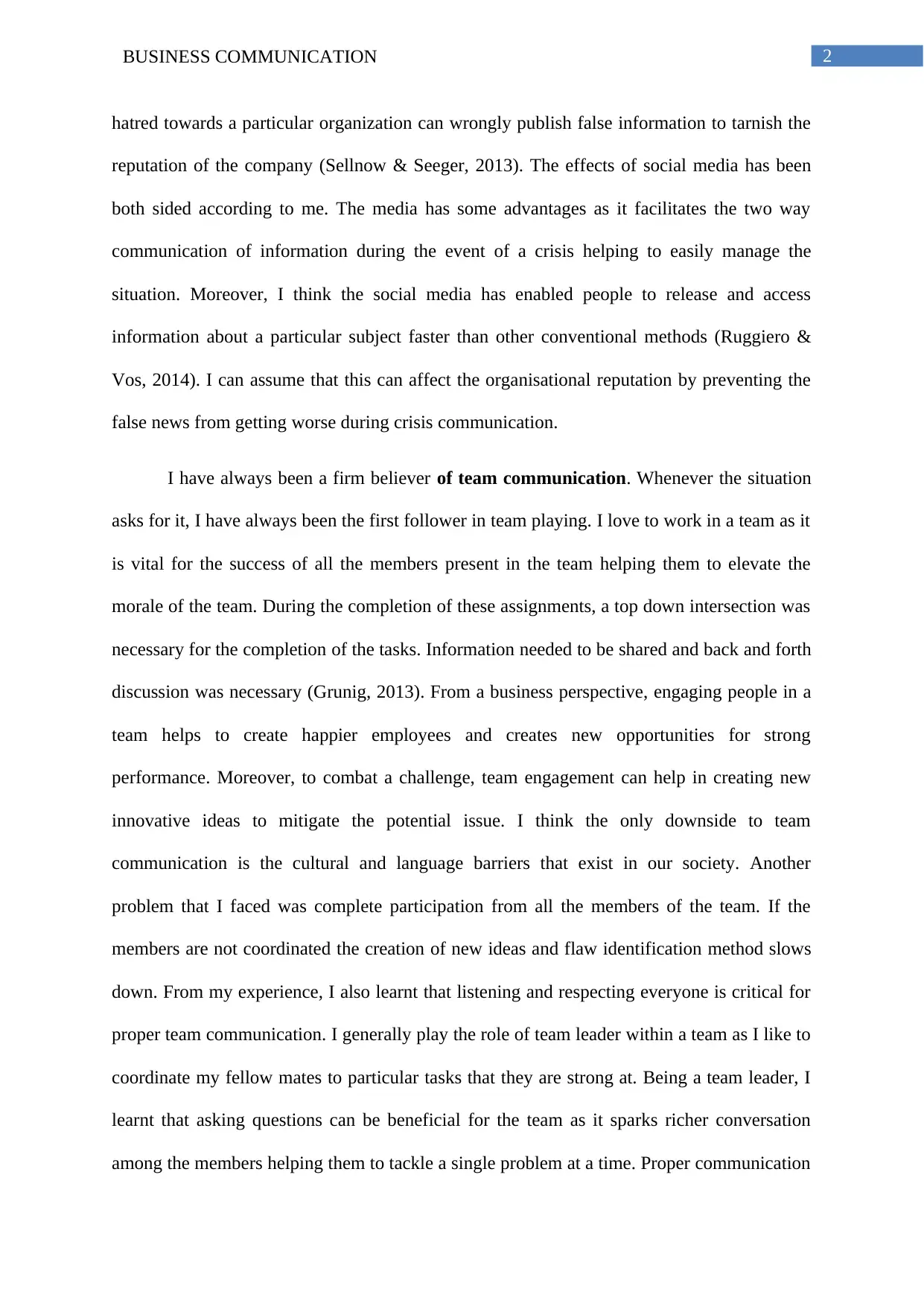
2BUSINESS COMMUNICATION
hatred towards a particular organization can wrongly publish false information to tarnish the
reputation of the company (Sellnow & Seeger, 2013). The effects of social media has been
both sided according to me. The media has some advantages as it facilitates the two way
communication of information during the event of a crisis helping to easily manage the
situation. Moreover, I think the social media has enabled people to release and access
information about a particular subject faster than other conventional methods (Ruggiero &
Vos, 2014). I can assume that this can affect the organisational reputation by preventing the
false news from getting worse during crisis communication.
I have always been a firm believer of team communication. Whenever the situation
asks for it, I have always been the first follower in team playing. I love to work in a team as it
is vital for the success of all the members present in the team helping them to elevate the
morale of the team. During the completion of these assignments, a top down intersection was
necessary for the completion of the tasks. Information needed to be shared and back and forth
discussion was necessary (Grunig, 2013). From a business perspective, engaging people in a
team helps to create happier employees and creates new opportunities for strong
performance. Moreover, to combat a challenge, team engagement can help in creating new
innovative ideas to mitigate the potential issue. I think the only downside to team
communication is the cultural and language barriers that exist in our society. Another
problem that I faced was complete participation from all the members of the team. If the
members are not coordinated the creation of new ideas and flaw identification method slows
down. From my experience, I also learnt that listening and respecting everyone is critical for
proper team communication. I generally play the role of team leader within a team as I like to
coordinate my fellow mates to particular tasks that they are strong at. Being a team leader, I
learnt that asking questions can be beneficial for the team as it sparks richer conversation
among the members helping them to tackle a single problem at a time. Proper communication
hatred towards a particular organization can wrongly publish false information to tarnish the
reputation of the company (Sellnow & Seeger, 2013). The effects of social media has been
both sided according to me. The media has some advantages as it facilitates the two way
communication of information during the event of a crisis helping to easily manage the
situation. Moreover, I think the social media has enabled people to release and access
information about a particular subject faster than other conventional methods (Ruggiero &
Vos, 2014). I can assume that this can affect the organisational reputation by preventing the
false news from getting worse during crisis communication.
I have always been a firm believer of team communication. Whenever the situation
asks for it, I have always been the first follower in team playing. I love to work in a team as it
is vital for the success of all the members present in the team helping them to elevate the
morale of the team. During the completion of these assignments, a top down intersection was
necessary for the completion of the tasks. Information needed to be shared and back and forth
discussion was necessary (Grunig, 2013). From a business perspective, engaging people in a
team helps to create happier employees and creates new opportunities for strong
performance. Moreover, to combat a challenge, team engagement can help in creating new
innovative ideas to mitigate the potential issue. I think the only downside to team
communication is the cultural and language barriers that exist in our society. Another
problem that I faced was complete participation from all the members of the team. If the
members are not coordinated the creation of new ideas and flaw identification method slows
down. From my experience, I also learnt that listening and respecting everyone is critical for
proper team communication. I generally play the role of team leader within a team as I like to
coordinate my fellow mates to particular tasks that they are strong at. Being a team leader, I
learnt that asking questions can be beneficial for the team as it sparks richer conversation
among the members helping them to tackle a single problem at a time. Proper communication
⊘ This is a preview!⊘
Do you want full access?
Subscribe today to unlock all pages.

Trusted by 1+ million students worldwide
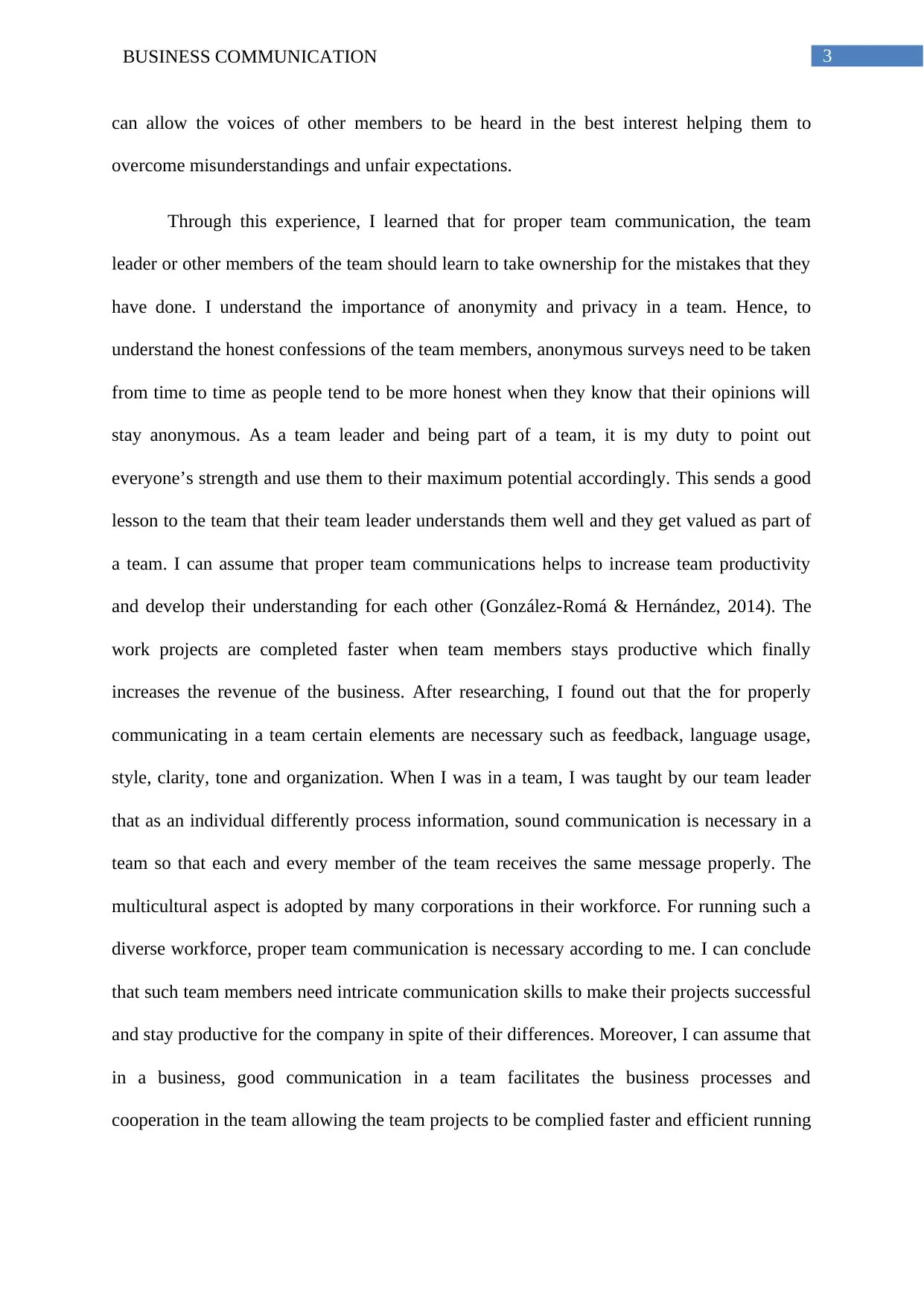
3BUSINESS COMMUNICATION
can allow the voices of other members to be heard in the best interest helping them to
overcome misunderstandings and unfair expectations.
Through this experience, I learned that for proper team communication, the team
leader or other members of the team should learn to take ownership for the mistakes that they
have done. I understand the importance of anonymity and privacy in a team. Hence, to
understand the honest confessions of the team members, anonymous surveys need to be taken
from time to time as people tend to be more honest when they know that their opinions will
stay anonymous. As a team leader and being part of a team, it is my duty to point out
everyone’s strength and use them to their maximum potential accordingly. This sends a good
lesson to the team that their team leader understands them well and they get valued as part of
a team. I can assume that proper team communications helps to increase team productivity
and develop their understanding for each other (González-Romá & Hernández, 2014). The
work projects are completed faster when team members stays productive which finally
increases the revenue of the business. After researching, I found out that the for properly
communicating in a team certain elements are necessary such as feedback, language usage,
style, clarity, tone and organization. When I was in a team, I was taught by our team leader
that as an individual differently process information, sound communication is necessary in a
team so that each and every member of the team receives the same message properly. The
multicultural aspect is adopted by many corporations in their workforce. For running such a
diverse workforce, proper team communication is necessary according to me. I can conclude
that such team members need intricate communication skills to make their projects successful
and stay productive for the company in spite of their differences. Moreover, I can assume that
in a business, good communication in a team facilitates the business processes and
cooperation in the team allowing the team projects to be complied faster and efficient running
can allow the voices of other members to be heard in the best interest helping them to
overcome misunderstandings and unfair expectations.
Through this experience, I learned that for proper team communication, the team
leader or other members of the team should learn to take ownership for the mistakes that they
have done. I understand the importance of anonymity and privacy in a team. Hence, to
understand the honest confessions of the team members, anonymous surveys need to be taken
from time to time as people tend to be more honest when they know that their opinions will
stay anonymous. As a team leader and being part of a team, it is my duty to point out
everyone’s strength and use them to their maximum potential accordingly. This sends a good
lesson to the team that their team leader understands them well and they get valued as part of
a team. I can assume that proper team communications helps to increase team productivity
and develop their understanding for each other (González-Romá & Hernández, 2014). The
work projects are completed faster when team members stays productive which finally
increases the revenue of the business. After researching, I found out that the for properly
communicating in a team certain elements are necessary such as feedback, language usage,
style, clarity, tone and organization. When I was in a team, I was taught by our team leader
that as an individual differently process information, sound communication is necessary in a
team so that each and every member of the team receives the same message properly. The
multicultural aspect is adopted by many corporations in their workforce. For running such a
diverse workforce, proper team communication is necessary according to me. I can conclude
that such team members need intricate communication skills to make their projects successful
and stay productive for the company in spite of their differences. Moreover, I can assume that
in a business, good communication in a team facilitates the business processes and
cooperation in the team allowing the team projects to be complied faster and efficient running
Paraphrase This Document
Need a fresh take? Get an instant paraphrase of this document with our AI Paraphraser
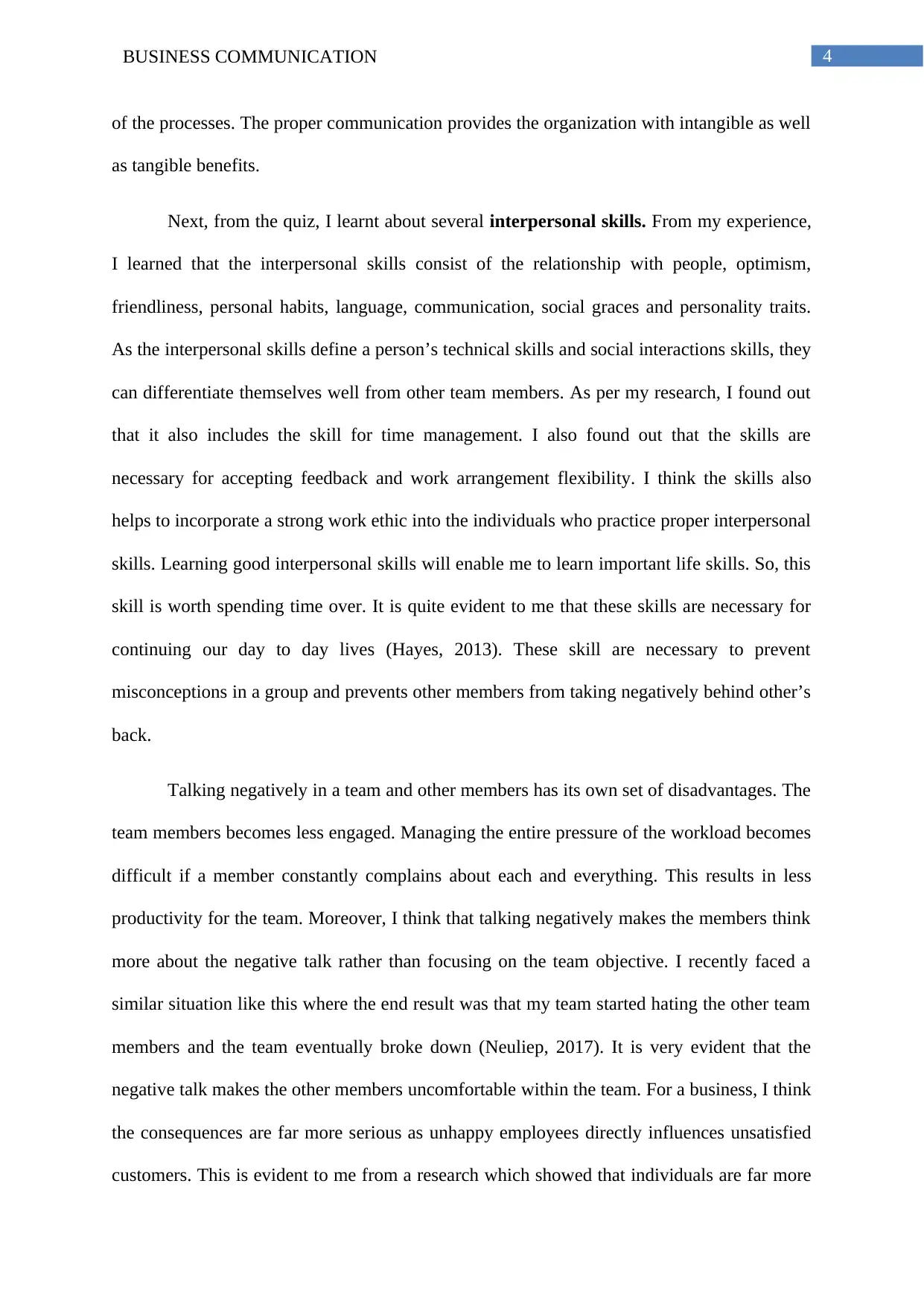
4BUSINESS COMMUNICATION
of the processes. The proper communication provides the organization with intangible as well
as tangible benefits.
Next, from the quiz, I learnt about several interpersonal skills. From my experience,
I learned that the interpersonal skills consist of the relationship with people, optimism,
friendliness, personal habits, language, communication, social graces and personality traits.
As the interpersonal skills define a person’s technical skills and social interactions skills, they
can differentiate themselves well from other team members. As per my research, I found out
that it also includes the skill for time management. I also found out that the skills are
necessary for accepting feedback and work arrangement flexibility. I think the skills also
helps to incorporate a strong work ethic into the individuals who practice proper interpersonal
skills. Learning good interpersonal skills will enable me to learn important life skills. So, this
skill is worth spending time over. It is quite evident to me that these skills are necessary for
continuing our day to day lives (Hayes, 2013). These skill are necessary to prevent
misconceptions in a group and prevents other members from taking negatively behind other’s
back.
Talking negatively in a team and other members has its own set of disadvantages. The
team members becomes less engaged. Managing the entire pressure of the workload becomes
difficult if a member constantly complains about each and everything. This results in less
productivity for the team. Moreover, I think that talking negatively makes the members think
more about the negative talk rather than focusing on the team objective. I recently faced a
similar situation like this where the end result was that my team started hating the other team
members and the team eventually broke down (Neuliep, 2017). It is very evident that the
negative talk makes the other members uncomfortable within the team. For a business, I think
the consequences are far more serious as unhappy employees directly influences unsatisfied
customers. This is evident to me from a research which showed that individuals are far more
of the processes. The proper communication provides the organization with intangible as well
as tangible benefits.
Next, from the quiz, I learnt about several interpersonal skills. From my experience,
I learned that the interpersonal skills consist of the relationship with people, optimism,
friendliness, personal habits, language, communication, social graces and personality traits.
As the interpersonal skills define a person’s technical skills and social interactions skills, they
can differentiate themselves well from other team members. As per my research, I found out
that it also includes the skill for time management. I also found out that the skills are
necessary for accepting feedback and work arrangement flexibility. I think the skills also
helps to incorporate a strong work ethic into the individuals who practice proper interpersonal
skills. Learning good interpersonal skills will enable me to learn important life skills. So, this
skill is worth spending time over. It is quite evident to me that these skills are necessary for
continuing our day to day lives (Hayes, 2013). These skill are necessary to prevent
misconceptions in a group and prevents other members from taking negatively behind other’s
back.
Talking negatively in a team and other members has its own set of disadvantages. The
team members becomes less engaged. Managing the entire pressure of the workload becomes
difficult if a member constantly complains about each and everything. This results in less
productivity for the team. Moreover, I think that talking negatively makes the members think
more about the negative talk rather than focusing on the team objective. I recently faced a
similar situation like this where the end result was that my team started hating the other team
members and the team eventually broke down (Neuliep, 2017). It is very evident that the
negative talk makes the other members uncomfortable within the team. For a business, I think
the consequences are far more serious as unhappy employees directly influences unsatisfied
customers. This is evident to me from a research which showed that individuals are far more
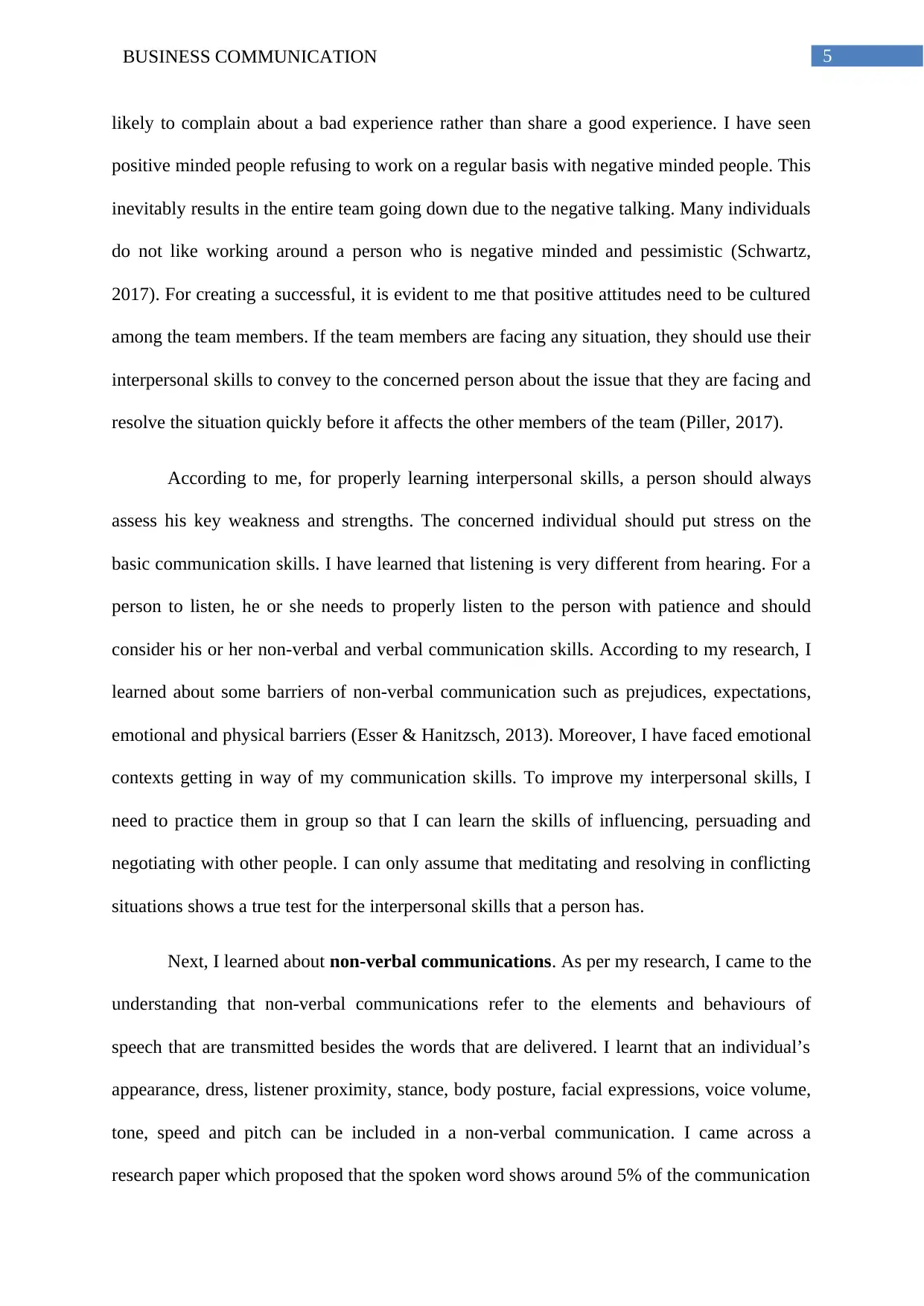
5BUSINESS COMMUNICATION
likely to complain about a bad experience rather than share a good experience. I have seen
positive minded people refusing to work on a regular basis with negative minded people. This
inevitably results in the entire team going down due to the negative talking. Many individuals
do not like working around a person who is negative minded and pessimistic (Schwartz,
2017). For creating a successful, it is evident to me that positive attitudes need to be cultured
among the team members. If the team members are facing any situation, they should use their
interpersonal skills to convey to the concerned person about the issue that they are facing and
resolve the situation quickly before it affects the other members of the team (Piller, 2017).
According to me, for properly learning interpersonal skills, a person should always
assess his key weakness and strengths. The concerned individual should put stress on the
basic communication skills. I have learned that listening is very different from hearing. For a
person to listen, he or she needs to properly listen to the person with patience and should
consider his or her non-verbal and verbal communication skills. According to my research, I
learned about some barriers of non-verbal communication such as prejudices, expectations,
emotional and physical barriers (Esser & Hanitzsch, 2013). Moreover, I have faced emotional
contexts getting in way of my communication skills. To improve my interpersonal skills, I
need to practice them in group so that I can learn the skills of influencing, persuading and
negotiating with other people. I can only assume that meditating and resolving in conflicting
situations shows a true test for the interpersonal skills that a person has.
Next, I learned about non-verbal communications. As per my research, I came to the
understanding that non-verbal communications refer to the elements and behaviours of
speech that are transmitted besides the words that are delivered. I learnt that an individual’s
appearance, dress, listener proximity, stance, body posture, facial expressions, voice volume,
tone, speed and pitch can be included in a non-verbal communication. I came across a
research paper which proposed that the spoken word shows around 5% of the communication
likely to complain about a bad experience rather than share a good experience. I have seen
positive minded people refusing to work on a regular basis with negative minded people. This
inevitably results in the entire team going down due to the negative talking. Many individuals
do not like working around a person who is negative minded and pessimistic (Schwartz,
2017). For creating a successful, it is evident to me that positive attitudes need to be cultured
among the team members. If the team members are facing any situation, they should use their
interpersonal skills to convey to the concerned person about the issue that they are facing and
resolve the situation quickly before it affects the other members of the team (Piller, 2017).
According to me, for properly learning interpersonal skills, a person should always
assess his key weakness and strengths. The concerned individual should put stress on the
basic communication skills. I have learned that listening is very different from hearing. For a
person to listen, he or she needs to properly listen to the person with patience and should
consider his or her non-verbal and verbal communication skills. According to my research, I
learned about some barriers of non-verbal communication such as prejudices, expectations,
emotional and physical barriers (Esser & Hanitzsch, 2013). Moreover, I have faced emotional
contexts getting in way of my communication skills. To improve my interpersonal skills, I
need to practice them in group so that I can learn the skills of influencing, persuading and
negotiating with other people. I can only assume that meditating and resolving in conflicting
situations shows a true test for the interpersonal skills that a person has.
Next, I learned about non-verbal communications. As per my research, I came to the
understanding that non-verbal communications refer to the elements and behaviours of
speech that are transmitted besides the words that are delivered. I learnt that an individual’s
appearance, dress, listener proximity, stance, body posture, facial expressions, voice volume,
tone, speed and pitch can be included in a non-verbal communication. I came across a
research paper which proposed that the spoken word shows around 5% of the communication
⊘ This is a preview!⊘
Do you want full access?
Subscribe today to unlock all pages.

Trusted by 1+ million students worldwide
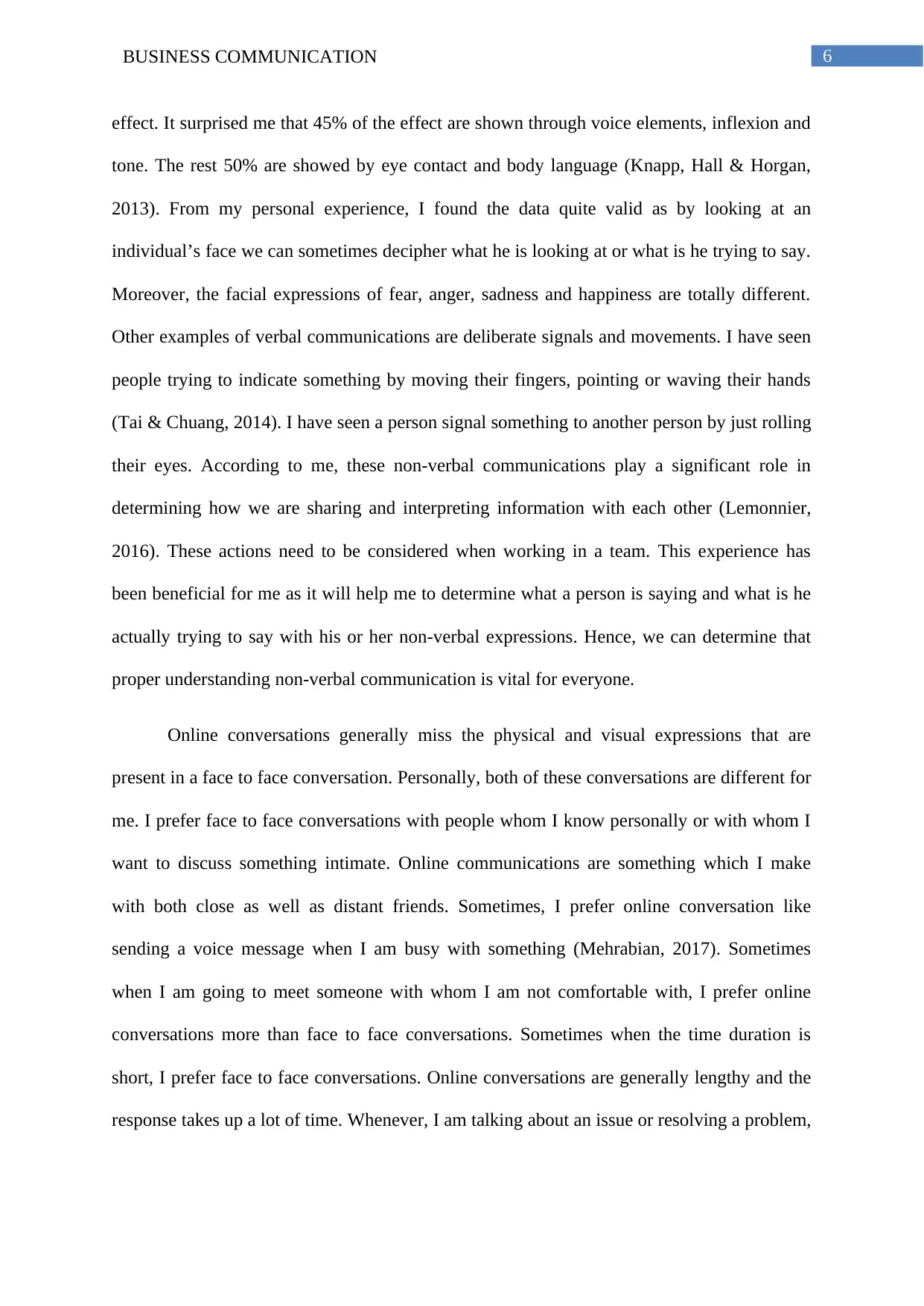
6BUSINESS COMMUNICATION
effect. It surprised me that 45% of the effect are shown through voice elements, inflexion and
tone. The rest 50% are showed by eye contact and body language (Knapp, Hall & Horgan,
2013). From my personal experience, I found the data quite valid as by looking at an
individual’s face we can sometimes decipher what he is looking at or what is he trying to say.
Moreover, the facial expressions of fear, anger, sadness and happiness are totally different.
Other examples of verbal communications are deliberate signals and movements. I have seen
people trying to indicate something by moving their fingers, pointing or waving their hands
(Tai & Chuang, 2014). I have seen a person signal something to another person by just rolling
their eyes. According to me, these non-verbal communications play a significant role in
determining how we are sharing and interpreting information with each other (Lemonnier,
2016). These actions need to be considered when working in a team. This experience has
been beneficial for me as it will help me to determine what a person is saying and what is he
actually trying to say with his or her non-verbal expressions. Hence, we can determine that
proper understanding non-verbal communication is vital for everyone.
Online conversations generally miss the physical and visual expressions that are
present in a face to face conversation. Personally, both of these conversations are different for
me. I prefer face to face conversations with people whom I know personally or with whom I
want to discuss something intimate. Online communications are something which I make
with both close as well as distant friends. Sometimes, I prefer online conversation like
sending a voice message when I am busy with something (Mehrabian, 2017). Sometimes
when I am going to meet someone with whom I am not comfortable with, I prefer online
conversations more than face to face conversations. Sometimes when the time duration is
short, I prefer face to face conversations. Online conversations are generally lengthy and the
response takes up a lot of time. Whenever, I am talking about an issue or resolving a problem,
effect. It surprised me that 45% of the effect are shown through voice elements, inflexion and
tone. The rest 50% are showed by eye contact and body language (Knapp, Hall & Horgan,
2013). From my personal experience, I found the data quite valid as by looking at an
individual’s face we can sometimes decipher what he is looking at or what is he trying to say.
Moreover, the facial expressions of fear, anger, sadness and happiness are totally different.
Other examples of verbal communications are deliberate signals and movements. I have seen
people trying to indicate something by moving their fingers, pointing or waving their hands
(Tai & Chuang, 2014). I have seen a person signal something to another person by just rolling
their eyes. According to me, these non-verbal communications play a significant role in
determining how we are sharing and interpreting information with each other (Lemonnier,
2016). These actions need to be considered when working in a team. This experience has
been beneficial for me as it will help me to determine what a person is saying and what is he
actually trying to say with his or her non-verbal expressions. Hence, we can determine that
proper understanding non-verbal communication is vital for everyone.
Online conversations generally miss the physical and visual expressions that are
present in a face to face conversation. Personally, both of these conversations are different for
me. I prefer face to face conversations with people whom I know personally or with whom I
want to discuss something intimate. Online communications are something which I make
with both close as well as distant friends. Sometimes, I prefer online conversation like
sending a voice message when I am busy with something (Mehrabian, 2017). Sometimes
when I am going to meet someone with whom I am not comfortable with, I prefer online
conversations more than face to face conversations. Sometimes when the time duration is
short, I prefer face to face conversations. Online conversations are generally lengthy and the
response takes up a lot of time. Whenever, I am talking about an issue or resolving a problem,
Paraphrase This Document
Need a fresh take? Get an instant paraphrase of this document with our AI Paraphraser
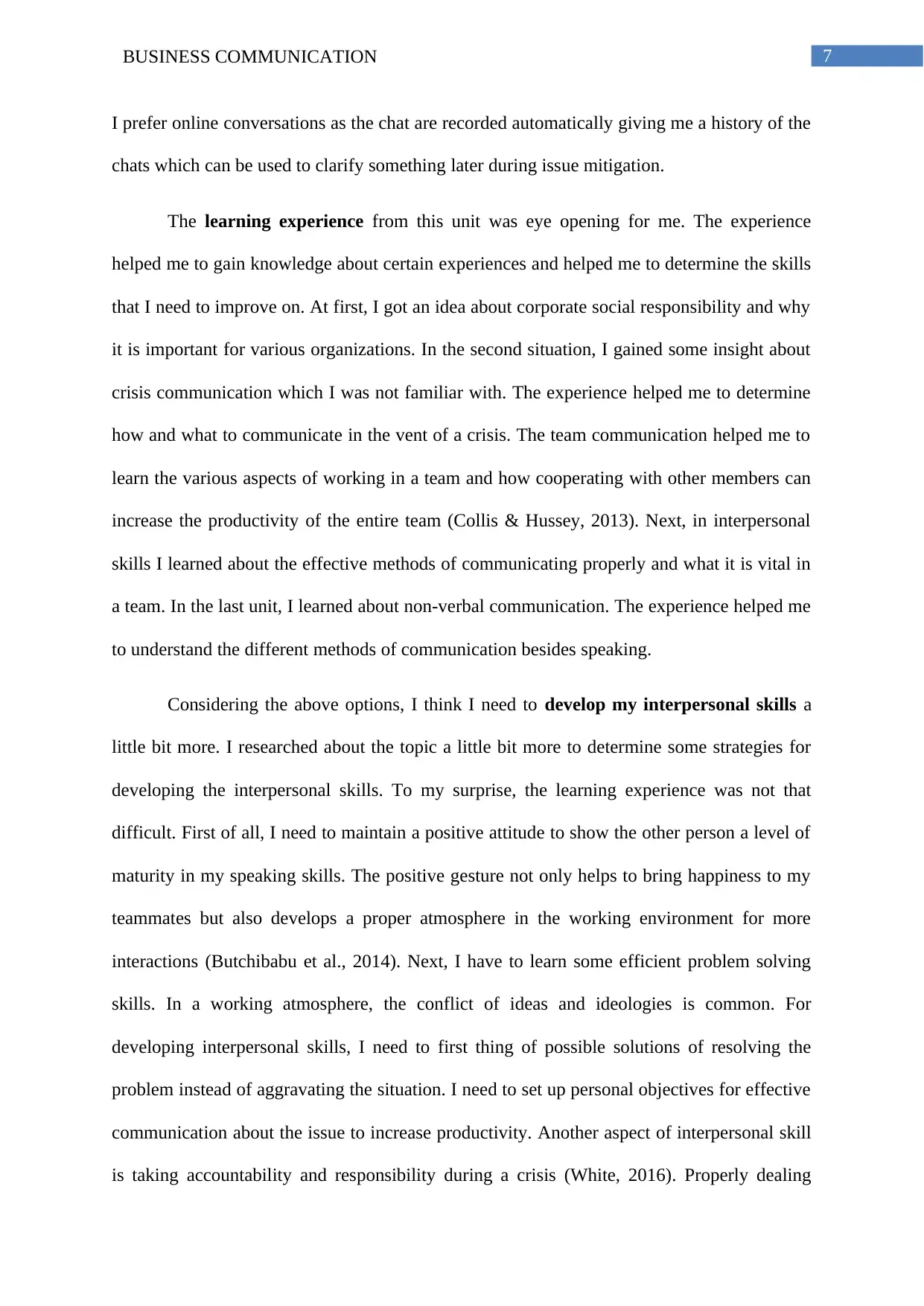
7BUSINESS COMMUNICATION
I prefer online conversations as the chat are recorded automatically giving me a history of the
chats which can be used to clarify something later during issue mitigation.
The learning experience from this unit was eye opening for me. The experience
helped me to gain knowledge about certain experiences and helped me to determine the skills
that I need to improve on. At first, I got an idea about corporate social responsibility and why
it is important for various organizations. In the second situation, I gained some insight about
crisis communication which I was not familiar with. The experience helped me to determine
how and what to communicate in the vent of a crisis. The team communication helped me to
learn the various aspects of working in a team and how cooperating with other members can
increase the productivity of the entire team (Collis & Hussey, 2013). Next, in interpersonal
skills I learned about the effective methods of communicating properly and what it is vital in
a team. In the last unit, I learned about non-verbal communication. The experience helped me
to understand the different methods of communication besides speaking.
Considering the above options, I think I need to develop my interpersonal skills a
little bit more. I researched about the topic a little bit more to determine some strategies for
developing the interpersonal skills. To my surprise, the learning experience was not that
difficult. First of all, I need to maintain a positive attitude to show the other person a level of
maturity in my speaking skills. The positive gesture not only helps to bring happiness to my
teammates but also develops a proper atmosphere in the working environment for more
interactions (Butchibabu et al., 2014). Next, I have to learn some efficient problem solving
skills. In a working atmosphere, the conflict of ideas and ideologies is common. For
developing interpersonal skills, I need to first thing of possible solutions of resolving the
problem instead of aggravating the situation. I need to set up personal objectives for effective
communication about the issue to increase productivity. Another aspect of interpersonal skill
is taking accountability and responsibility during a crisis (White, 2016). Properly dealing
I prefer online conversations as the chat are recorded automatically giving me a history of the
chats which can be used to clarify something later during issue mitigation.
The learning experience from this unit was eye opening for me. The experience
helped me to gain knowledge about certain experiences and helped me to determine the skills
that I need to improve on. At first, I got an idea about corporate social responsibility and why
it is important for various organizations. In the second situation, I gained some insight about
crisis communication which I was not familiar with. The experience helped me to determine
how and what to communicate in the vent of a crisis. The team communication helped me to
learn the various aspects of working in a team and how cooperating with other members can
increase the productivity of the entire team (Collis & Hussey, 2013). Next, in interpersonal
skills I learned about the effective methods of communicating properly and what it is vital in
a team. In the last unit, I learned about non-verbal communication. The experience helped me
to understand the different methods of communication besides speaking.
Considering the above options, I think I need to develop my interpersonal skills a
little bit more. I researched about the topic a little bit more to determine some strategies for
developing the interpersonal skills. To my surprise, the learning experience was not that
difficult. First of all, I need to maintain a positive attitude to show the other person a level of
maturity in my speaking skills. The positive gesture not only helps to bring happiness to my
teammates but also develops a proper atmosphere in the working environment for more
interactions (Butchibabu et al., 2014). Next, I have to learn some efficient problem solving
skills. In a working atmosphere, the conflict of ideas and ideologies is common. For
developing interpersonal skills, I need to first thing of possible solutions of resolving the
problem instead of aggravating the situation. I need to set up personal objectives for effective
communication about the issue to increase productivity. Another aspect of interpersonal skill
is taking accountability and responsibility during a crisis (White, 2016). Properly dealing
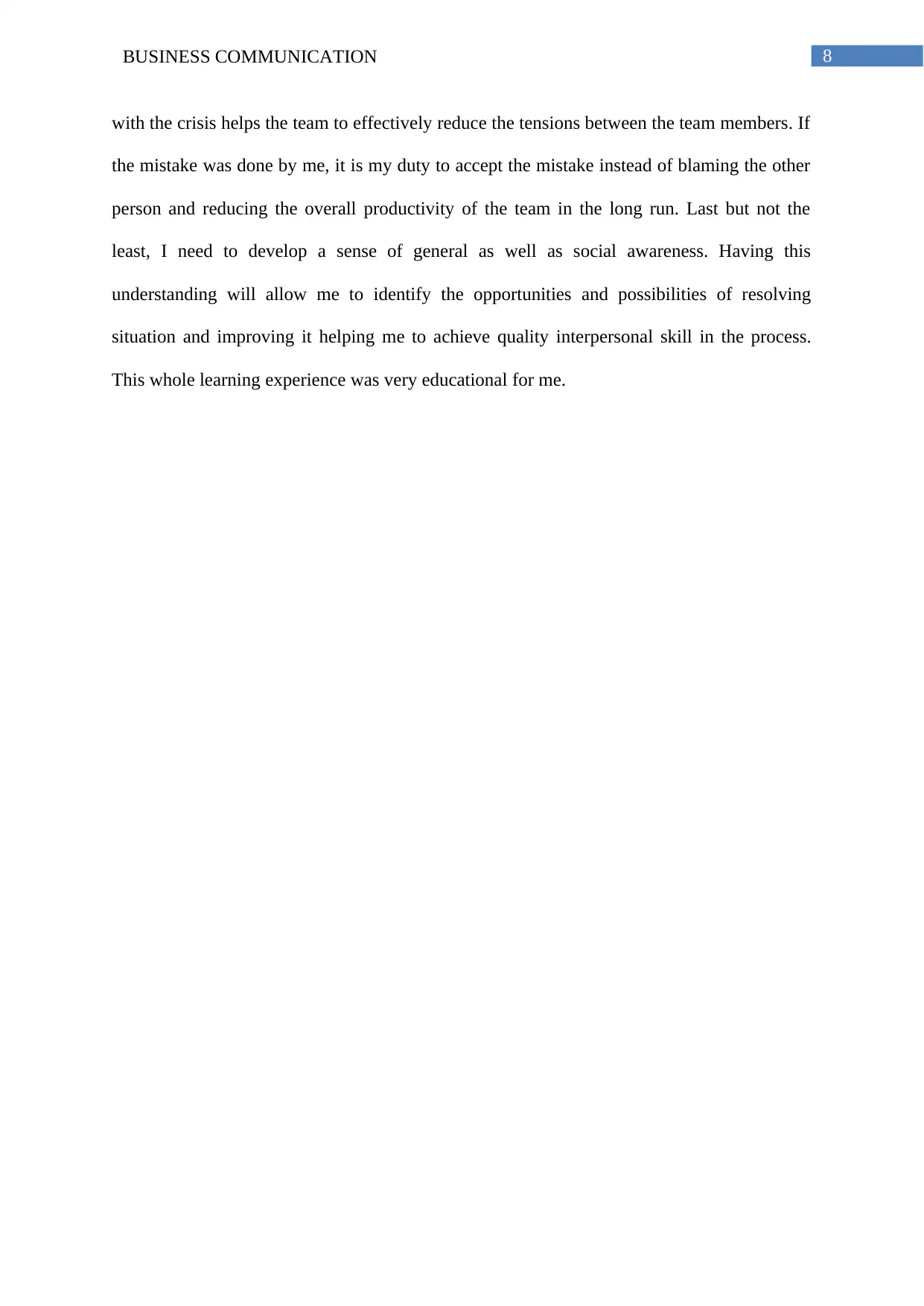
8BUSINESS COMMUNICATION
with the crisis helps the team to effectively reduce the tensions between the team members. If
the mistake was done by me, it is my duty to accept the mistake instead of blaming the other
person and reducing the overall productivity of the team in the long run. Last but not the
least, I need to develop a sense of general as well as social awareness. Having this
understanding will allow me to identify the opportunities and possibilities of resolving
situation and improving it helping me to achieve quality interpersonal skill in the process.
This whole learning experience was very educational for me.
with the crisis helps the team to effectively reduce the tensions between the team members. If
the mistake was done by me, it is my duty to accept the mistake instead of blaming the other
person and reducing the overall productivity of the team in the long run. Last but not the
least, I need to develop a sense of general as well as social awareness. Having this
understanding will allow me to identify the opportunities and possibilities of resolving
situation and improving it helping me to achieve quality interpersonal skill in the process.
This whole learning experience was very educational for me.
⊘ This is a preview!⊘
Do you want full access?
Subscribe today to unlock all pages.

Trusted by 1+ million students worldwide
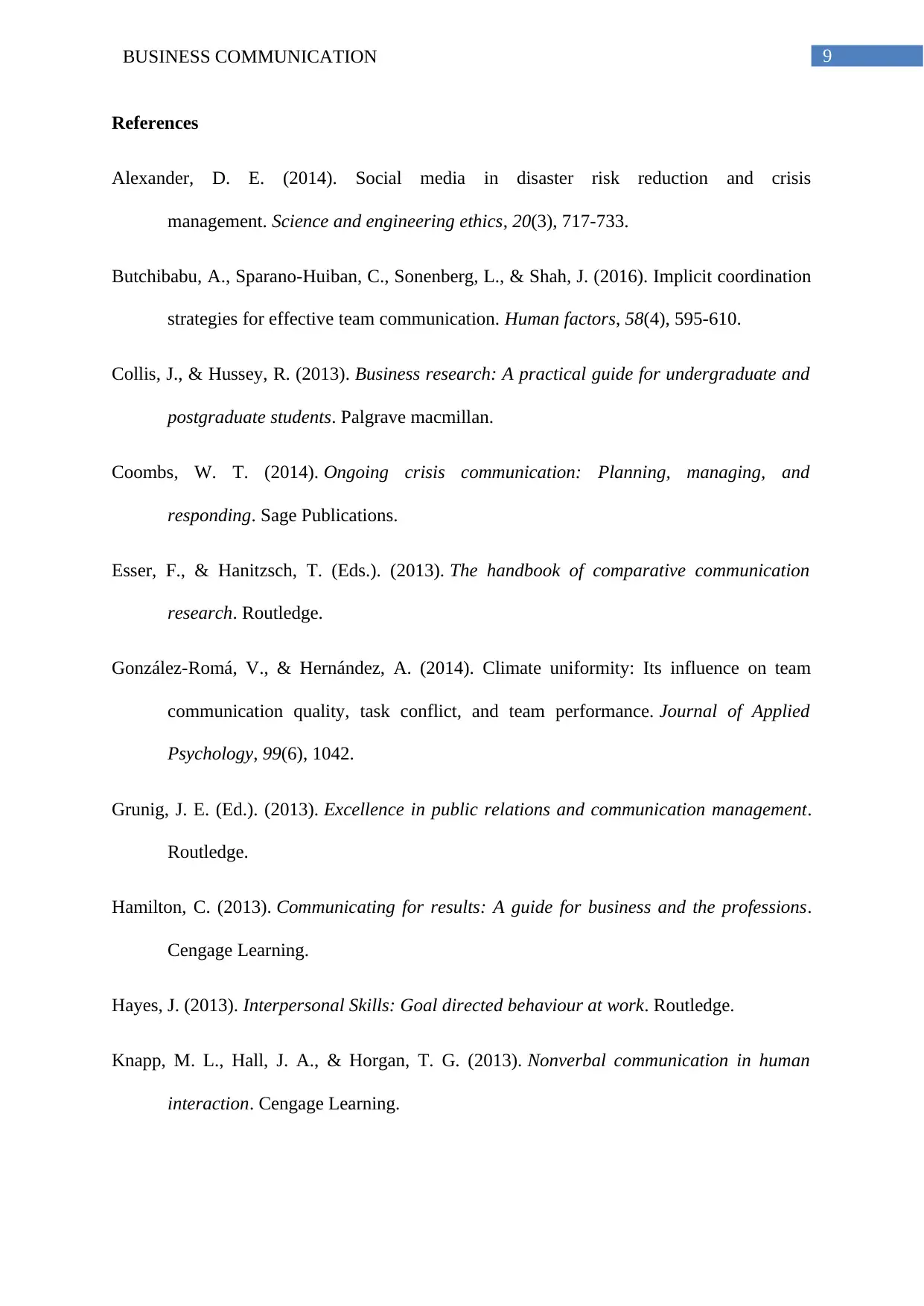
9BUSINESS COMMUNICATION
References
Alexander, D. E. (2014). Social media in disaster risk reduction and crisis
management. Science and engineering ethics, 20(3), 717-733.
Butchibabu, A., Sparano-Huiban, C., Sonenberg, L., & Shah, J. (2016). Implicit coordination
strategies for effective team communication. Human factors, 58(4), 595-610.
Collis, J., & Hussey, R. (2013). Business research: A practical guide for undergraduate and
postgraduate students. Palgrave macmillan.
Coombs, W. T. (2014). Ongoing crisis communication: Planning, managing, and
responding. Sage Publications.
Esser, F., & Hanitzsch, T. (Eds.). (2013). The handbook of comparative communication
research. Routledge.
González-Romá, V., & Hernández, A. (2014). Climate uniformity: Its influence on team
communication quality, task conflict, and team performance. Journal of Applied
Psychology, 99(6), 1042.
Grunig, J. E. (Ed.). (2013). Excellence in public relations and communication management.
Routledge.
Hamilton, C. (2013). Communicating for results: A guide for business and the professions.
Cengage Learning.
Hayes, J. (2013). Interpersonal Skills: Goal directed behaviour at work. Routledge.
Knapp, M. L., Hall, J. A., & Horgan, T. G. (2013). Nonverbal communication in human
interaction. Cengage Learning.
References
Alexander, D. E. (2014). Social media in disaster risk reduction and crisis
management. Science and engineering ethics, 20(3), 717-733.
Butchibabu, A., Sparano-Huiban, C., Sonenberg, L., & Shah, J. (2016). Implicit coordination
strategies for effective team communication. Human factors, 58(4), 595-610.
Collis, J., & Hussey, R. (2013). Business research: A practical guide for undergraduate and
postgraduate students. Palgrave macmillan.
Coombs, W. T. (2014). Ongoing crisis communication: Planning, managing, and
responding. Sage Publications.
Esser, F., & Hanitzsch, T. (Eds.). (2013). The handbook of comparative communication
research. Routledge.
González-Romá, V., & Hernández, A. (2014). Climate uniformity: Its influence on team
communication quality, task conflict, and team performance. Journal of Applied
Psychology, 99(6), 1042.
Grunig, J. E. (Ed.). (2013). Excellence in public relations and communication management.
Routledge.
Hamilton, C. (2013). Communicating for results: A guide for business and the professions.
Cengage Learning.
Hayes, J. (2013). Interpersonal Skills: Goal directed behaviour at work. Routledge.
Knapp, M. L., Hall, J. A., & Horgan, T. G. (2013). Nonverbal communication in human
interaction. Cengage Learning.
Paraphrase This Document
Need a fresh take? Get an instant paraphrase of this document with our AI Paraphraser
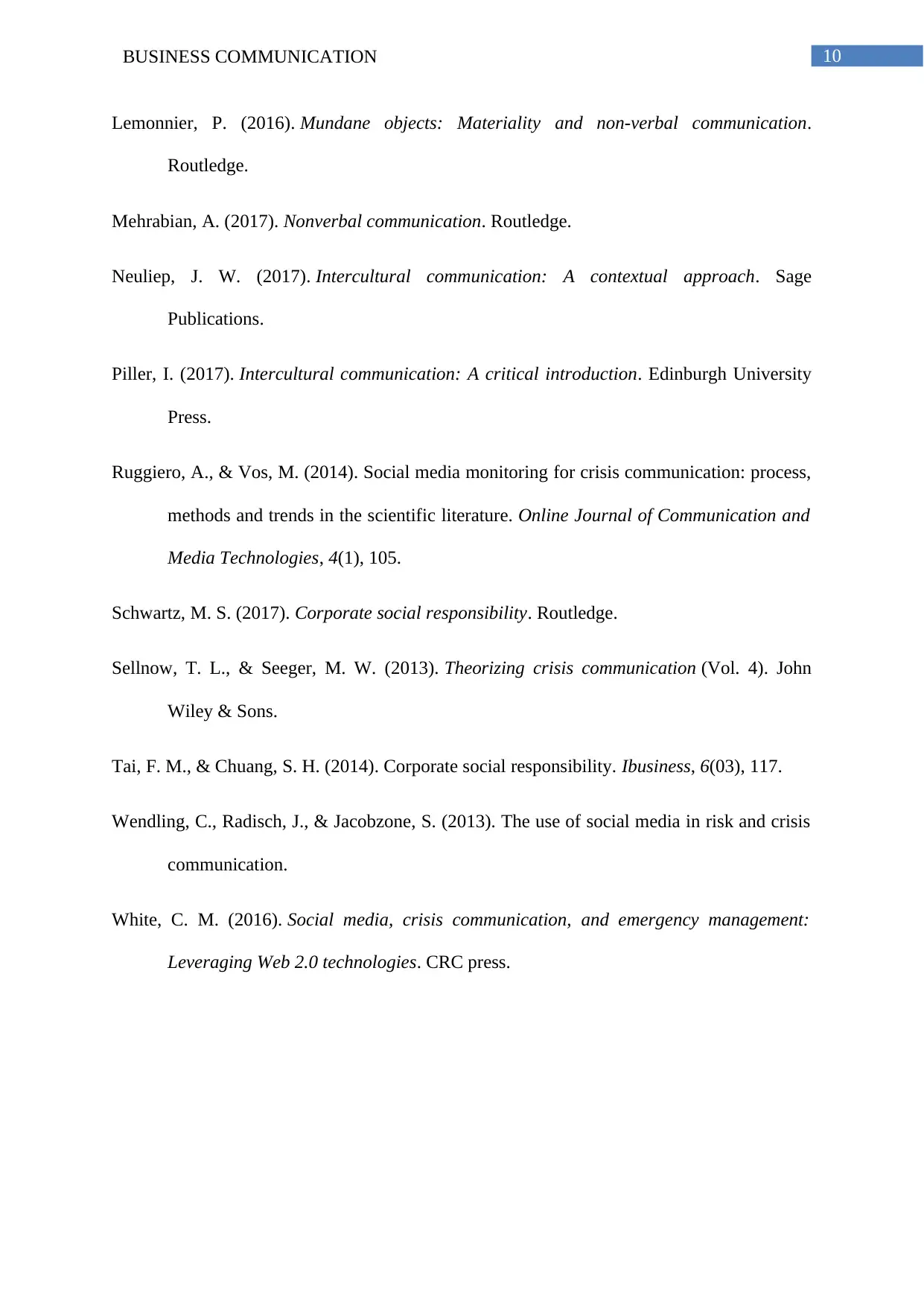
10BUSINESS COMMUNICATION
Lemonnier, P. (2016). Mundane objects: Materiality and non-verbal communication.
Routledge.
Mehrabian, A. (2017). Nonverbal communication. Routledge.
Neuliep, J. W. (2017). Intercultural communication: A contextual approach. Sage
Publications.
Piller, I. (2017). Intercultural communication: A critical introduction. Edinburgh University
Press.
Ruggiero, A., & Vos, M. (2014). Social media monitoring for crisis communication: process,
methods and trends in the scientific literature. Online Journal of Communication and
Media Technologies, 4(1), 105.
Schwartz, M. S. (2017). Corporate social responsibility. Routledge.
Sellnow, T. L., & Seeger, M. W. (2013). Theorizing crisis communication (Vol. 4). John
Wiley & Sons.
Tai, F. M., & Chuang, S. H. (2014). Corporate social responsibility. Ibusiness, 6(03), 117.
Wendling, C., Radisch, J., & Jacobzone, S. (2013). The use of social media in risk and crisis
communication.
White, C. M. (2016). Social media, crisis communication, and emergency management:
Leveraging Web 2.0 technologies. CRC press.
Lemonnier, P. (2016). Mundane objects: Materiality and non-verbal communication.
Routledge.
Mehrabian, A. (2017). Nonverbal communication. Routledge.
Neuliep, J. W. (2017). Intercultural communication: A contextual approach. Sage
Publications.
Piller, I. (2017). Intercultural communication: A critical introduction. Edinburgh University
Press.
Ruggiero, A., & Vos, M. (2014). Social media monitoring for crisis communication: process,
methods and trends in the scientific literature. Online Journal of Communication and
Media Technologies, 4(1), 105.
Schwartz, M. S. (2017). Corporate social responsibility. Routledge.
Sellnow, T. L., & Seeger, M. W. (2013). Theorizing crisis communication (Vol. 4). John
Wiley & Sons.
Tai, F. M., & Chuang, S. H. (2014). Corporate social responsibility. Ibusiness, 6(03), 117.
Wendling, C., Radisch, J., & Jacobzone, S. (2013). The use of social media in risk and crisis
communication.
White, C. M. (2016). Social media, crisis communication, and emergency management:
Leveraging Web 2.0 technologies. CRC press.
1 out of 11
Related Documents
Your All-in-One AI-Powered Toolkit for Academic Success.
+13062052269
info@desklib.com
Available 24*7 on WhatsApp / Email
![[object Object]](/_next/static/media/star-bottom.7253800d.svg)
Unlock your academic potential
Copyright © 2020–2025 A2Z Services. All Rights Reserved. Developed and managed by ZUCOL.




